- Home
- Salvador Mercer
Ranger Rising: Claire-Agon Ranger Book 1 (Ranger Series) Page 2
Ranger Rising: Claire-Agon Ranger Book 1 (Ranger Series) Read online
Page 2
Of course, there were not supposed to be any wizards left in Agon, not after the Great Dragon War a millennium ago. The war devastated Kesh, which was once a large, bustling realm of artisans, educators, philosophers, and, of course, magicians who lived in relative peace and harmony with their fellow man.
Until one particular wizard, the High Arch-Mage of Kesh, Am-Torra, who was proud, greedy, and more than a bit haughty, changed all that. It was said it was he who wanted not only the gold of the great dragon drakes of the North but their many plunders as well, including books, scrolls, and other artifacts with powerful spells and magics entombed within them. It was said he undertook a great journey to the North, where they plundered and killed several large drakes before returning with their spoils. The remaining dragons, angered by this heinous act, took to the skies and, in an unprecedented act of war, took out the entire kingdom of Kesh, burning it into utter ruin, and, in this event, destroyed the High Arch-Mage of Kesh, Ke-Torra himself, or, at least, that was what the stories said.
There were many collateral actions as well, where most of the remaining realms, in an attempt to assist Kesh and protect themselves, perished in the dragon wars to follow. Blinded by rage, the dragons destroyed all in their path, but this same rage also brought about their doom as it appeared all of the dragons also perished by the hands of great wizards and elite warriors.
The phrase it was said was often used because right after the great Dragon-Wizard War, the transit event of Dor Akun occurred in its two hundred year cycle. Great tidal waves and earthquakes quickly finished what little was left of the many great civilizations of Claire Agon. Thus, for the last thousand years, most, if not all, of the great achievements of the civilized realms of Agon were lost to mankind, and a sort of barbaric Dark Age encompassed the land. Centers of learning and lore, great libraries and universities were utterly destroyed between the two events, and while written records either ceased to exist or became very rare indeed, facts were passed on from father to son and from mother to daughter. Facts became legends, and in time, some legends became myths, and so the dangerously reduced population of Agon started anew, settling in ruined strongholds and cities, repairing what they could, yet failing to build much of anything new.
Farming and hunting, the old ways of Agon before the great civilizations formed now, returned to take over as hunters and gatherers rebuilt. Each time the “Death World” approached, the myths and legends would become real once again, but with each passing of Dor Akun, the inhabitants of Claire Agon adapted and became a bit stronger, not just to survive the event, but the rush of charged particles changed them. The event was marked over and over again, and in time, some prepared for it. Some even welcomed it.
And so it was that on a certain morning, high above the world on a cliff of the Border Mountains, stood three men. They were dressed differently from the many men below them along the ancient trade road. They wore cloaks of red, gold, and black, and each man had a staff with some sort of stone or gem set in the top of it. The staves were metallic, and oddly enough, the men wore pointed hats with some small tassels around the edges: however, each man was clearly of a different age. One was elderly, the other mature, and the third a young adult.
The other men below them wore black leather boots, burlap trousers, and cloth tunics. Most had cloaks, also black, with hoods covering their swarthy faces. They stood taller than most other inhabitants of Agon and more slender, with wicked curved blades, crossbows, slings, and spears. They marched westward from Kesh over the ancient mountain pass, which was once blocked completely due to earthquakes and tidal forces of the last transit event, but recently had been cleared and, in many places, augmented to allow for large lock carts to be brought by horses and oxen. The lock carts all had iron bars welded together to form an iron cage with a lone gate at the rear. They were all empty now, but they had not yet fulfilled their purpose.
Upon crossing the high mountain pass, the supply train continued its slow but steady approach into the next realm, the realm of Ulatha, and there was to be no warning of their arrival.
At the pass itself, many of the black-clothed men worked on erecting a wooden wall twelve feet high with wooden square towers at either end of a double wooden gate. The wall ended on either side by reaching the mountain cliffs of the pass so that the only way through the wall was the main gate, sandwiched between the two towers. Each tower had a square vaulted roof attached to it for shelter and shade, though the weather was cool and crisp as spring had just arrived and winter was quickly retreating. The tower roofs and the main gate were not quite finished yet, but the main wall spanning nearly two hundred feet was complete. Several other black-clothed men stood at either end of the wall and gate and looked around intently.
“Is everything in order?” asked the oldest looking of the three men as he leaned on his staff and looked at the other two, his bushy white eyebrows slightly raised.
“Yes, Am-Ohkre,” said the mature man, moving his own staff to his other hand. “Hork is preparing the troops for an assault at dawn tomorrow. We should be in position by then.”
Am-Ohkre looked at the mature man who just answered him, taking a moment to lower his eyebrows but never blinking. “Careful, Ke-Tor, that the Ulathans do not detect our presence before then. We do not have enough resources for our attack if they are prepared. Manpower is in short supply,” he said, nodding to the many brigands working below them.
“We will camp by day at the old keep at the base of the trade road,” Ke-Tor said, motioning far below at the valley floor with a quick move of his staff in his right hand. “By sundown today, we will be ready to move out and set the ambush before dawn tomorrow. Ulatha will be ours.”
“I hope so,” replied the elder man. “Is your apprentice Khan ready for the task? He looked at the young man standing beside Ke-Tor.
Ke-Tor stepped back to allow Khan to see Am-Ohkre. “Well?” Ke-Tor asked, arching his own brow.
“Yes, Master, I look forward to my duty,” Khan said in deference to his mentor, continuing to fondle his necklace. “Do you want me to lead the assault on the Ulathan capital?”
“No, stay with the train and make sure no one raises an alarm,” Am-Ohkre responded, interrupting Ke-Tor before he could respond. “The fools built homesteads east of their capital. There are farmers and other peasants spread out all along the Gregus River on the west bank. We must slip through them first during the night. In fact, one fool built their hovel east of the river near the Earlstyne Forest. The entire area is infested with them. See to it that members of your company take care of them first.”
“I will, Master,” Khan said, looking down at the valley floor, unable to see the offending homestead but wondering exactly who would dare to live any place near the Earlstyne Forest, east of the Gregus. Kesh occasionally sent raiding parties that way, though it had been seven years since the last major incursion, and many Kesh brigands died while transiting the forest. It now had a bad reputation in Kesh as a haunted forest, a forest of death. Who indeed would dare live there? he thought.
Another man, clad in black, approached the trio from the rock wall stairs behind them. He was different from the other men working below. Despite his hood, his face wasn’t swarthy but pale, and his stature was much like someone from Ulatha, not as tall, but stockier than the men from Kesh. He walks differently, thought Khan, who hadn’t even heard him approach, though Am-Ohkre turned to face the man before he reached them. I thought one’s hearing was supposed to worsen as one aged? Khan thought to himself, pondering just how the old man managed to hear the newcomer who was as silent as a cat.
“Kendral,” the Arch-Mage said, facing the darkly clad man. “Are you and your people ready?”
Better to call them assassins, thought Khan sourly.
The other man was silent, and whether or not he expected them to hear him, he showed no outward signs of surprise, unlike Ke-Tor, who seemed flummoxed at
this man’s arrival. “Yes, Am-Ohkre, my people are in position and the so-called ‘King of Ulatha’ will be dead as soon as you order it.”
Khan hated the man and his kind. It was bad enough they had to attack Ulatha, through no fault of its own, but to murder someone in their sleep: and sleep it would be as Khan was privy to their details, which called for a predawn attack.
“Good,” Am-Ohkre said with a mild grin and twinkle in his eye.
Khan thought the Arch-Mage was enjoying the prospect of the Ulathan king’s demise too much. They didn’t need to be here, despite what High-Mage Am-Sultain thought. Khan knew that Kesh was suffering from a serious lack of resources, and even after a millennium, the wizard ranks were just starting to grow enough for any kind of action. There were only three Arch-Mages in all of Kesh, and not more than a dozen wizards, like his master, who could perform the arts of magic and the arcane. Even apprentices like himself were rare as too many of the noble Kesh bloodlines had perished and what was left from the commoners’ class had degenerated into thieves and cutthroats, raiders and brigands. Khan thought to himself, we are nothing more than that.
“You’re sure the stones will work properly?” Kendral asked.
“Yes. Have no worries: the magic of the stones will alert you and yours when the time is right. Keep them safe and keep them close. After many years, we are down to just a few more days, and I will not tolerate failure,” Am-Ohkre said, his twinkle quickly gone, replaced with a scowl.
“Very well. I go now to take care of some last minute affairs.” The assassin turned and walked back to the small staircase that was carved into the rock, and descended into the mountain pass.
“He did that on purpose!” Ke-Tor said.
“Do not blame him for your inattentiveness. One day you may find a knife stuck in your back,” Am-Ohkre responded, turning back to review the work being done below on the gate and wall.
Khan inwardly chuckled at the exchange, taking some small measure of comfort at his mentor’s discomfort. For too many years, he felt he was always on the receiving end of his mentor’s verbal barbs and constant criticisms, so it felt redeeming for a change to see a measure of karma meted out to his mentor.
“We have no need for them!” Ke-Tor exclaimed, seemingly more flustered now at the thought of a dagger being stuck into his back. “Waste of gold and effort, something any Kesh warrior could do easily enough.”
Am-Ohkre turned to look at the middle-aged wizard before speaking. “Perhaps, but the only Ulathans that could rally any kind of resistance against us will be the king and his cousin. Consider the payment as a form of . . . insurance,” the elder mage said with a less stinging tone in his voice.
“I still disapprove. I do not trust the Balarians for that exact reason. Too many thieves and backstabbers. I would torch their lands if the decision was mine.”
“And that is why you are not leading this attack,” Am-Ohkre said. “You need to learn to mind your temper, perhaps even your tongue. You could take a lesson from your own apprentice on this matter.” Am-Ohkre then nodded to Khan.
Khan’s contentment at his mentor’s discomfort quickly left once the attention of both wizard and Arch-Mage were on him, but in keeping with Am-Ohkre’s observations, Khan decided to simply bow his head just a tad, showing respect and deference, tucking his healing necklace under his tunic and hoping the conversation would not focus on him further.
Ke-Tor looked at Khan and then back at the Arch-Mage, deciding to drop the matter. “Fine, but why did Am-Sultain decide to make the attacks this year? I thought we all agreed on a ten-year master plan. We should have three more years to prepare. None of the apprentices are ready. If I did not know better, I would say he is holding something back from us.”
Now Khan was starting to feel very uncomfortable. Whose fault is that, he thought to himself. He should have been initiated last year, but Ke-Tor held him back. Jealousy and a hunger for power were two of the traits that marked a wizard from Kesh, and especially a wizard as ambitious as Ke-Tor. Even his name was a self-indulging reference of the greatest Arch-Mage ever, Ke-Torra.
“Sultain has his reasons,” Am-Ohkre said, and Khan noted the familiar use of the High-Mage’s name without the proper Kesh title to show respect. It was no secret Am-Ohkre thought he should be the High-Mage. He was only one of three Arch-Mages. The third Arch-Mage, Am-Shee, was leading the other Kesh assault on the realm of Rockton.
“He should have finished the Ulathans off seven years ago when they entered Kesh!” Ke-Tor said, obvious disgust in his voice. “They took serious losses then.”
“Yes, but so did we, and although they routed the garrison at Ulsthor, they retreated without coming closer to Keshtor. Thinking themselves victorious was a tool to be exploited and an advantage to be pressed. As I said, Sultain has his reasons.”
“I am sure he does, but as you said, our manpower is low and we are attacking not one realm but two. This is not wise to split our forces.”
“Very observant of you, Ke-Tor, but Sultain has the Eye of Seeing, and our own scroll lore has confirmed the approach of Dor Akun. If we do not move now, there will be no slaves to capture. The peasants of Ulatha and Rockton are not aware of Dor Akun’s approach, and no doubt many of them will perish if we do not intervene and . . .”—there was a long pause as Am-Ohkre chose his words for effect—“assist them in preserving their precious but miserable lives. Once preserved, they will have no choice but to serve Kesh. If you still disagree, I could arrange a meeting between you and Sultain to discuss the matter.”
Ke-Tor understood the implications of what the Arch-Mage was saying. While all of them were arrogant, Am-Sultain was perhaps the least agreeable of the three, unlike Am-Ohkre, and any discussion between him and the High-Mage would, no doubt, be most unpleasant, if not fatal. “No need for that,” Ke-Tor finally responded. “We should proceed according to plan. The border gate will be finished by sundown, and then we can move to the old keep in the valley.”
“Any reports from the North?” Am-Ohkre asked.
“None. The northern scouts returned late last night and reported that there are no barbarian contacts near Ulatha.” This was significant because, while the Kesh were known for their raids and brigand activities, the desolate dragon lands to the north were inhabited by wild Agonians referred to as barbarians, and they were literally the only other race on Agon that actually raided the Kesh.
“Then our plans are set. We attack in two days, just before dawn. Is the Horn of Isla ready?” Am-Ohkre asked.
“Yes, Hork has made arrangements and the horn should be here by nightfall.” Ke-Tor nodded.
Khan knew the large horn required an entire wagon to transport and it was enchanted. It was too large for a Kesh to sound, but it was perfect for one of the stone trolls that occasionally served the wizards. Of course, there was no mention of this. His mentor, Ke-Tor, was not thorough in his answer, and Am-Ohkre seemed too distracted to notice. If a stone troll wasn’t with the horn, then it was useless to serve as the signal. “I assume there is a troll accompanying the horn?” Khan said, finally deciding to add his voice to the conversation.
“Do not be an idiot, Khan, of course there is,” said Ke-Tor, now mildly annoyed by his apprentice asking the obvious. “I said the horn would be here tonight.”
“It would be a shame if the horn arrived but not the troll,” Khan replied, holding his ground.
Ke-Tor seemed to think this over for a second and then turned back to Am-Ohkre. “We are finished here, then?”
“Yes, I think I will retire to my tent until we move out tomorrow. You will see to the horn?”
More than mildly annoyed now, Ke-Tor looked at Khan for a moment and then back to the Arch-Mage. “Yes, I will take care of it.” And then he turned and headed down to the brigand camp below.
Am-Ohkre looked at Khan for a moment, waiting to see if Khan would say somet
hing, and then he nodded and left Khan standing alone along the small cliff overlooking Ulatha.
Khan didn’t like attacking anyone. Perhaps he wasn’t cut out for the life that was chosen for him. In Kesh society, many of the brigands simply took slaves for wives, and the women bore children who were either slaved if female or raised as raiders, fighters, and thieves if male. A few noble-born Kesh were different. If their bloodline was pure, their offspring would follow the father and become wizards, or at least apprentice wizards like Khan was now.
From what Khan knew, his father was a wizard and his mother was a slave. Both died when he was young, and he could barely remember them. Ke-Tor took Khan in as his apprentice, which most likely saved the young man’s life, but it was not an altruistic gesture. Ke-Tor gained an apprentice who was treated much as a slave, albeit a gifted slave, as any other. Khan had conflicted feelings for his mentor, both hating him for his cruel treatment and grateful he had sheltered him. Sheltered him for what, the life of an apprentice wizard?
More apprentices were killed than became wizards, as magic wasn’t as safe as one would think. Spells backfired and potions and scrolls weren’t always exact. Also, considering the base nature of the Kesh, oftentimes an ambitious and greedy apprentice would see to it that a “magic accident” occurred, oftentimes killing a rival apprentice. Finally, add the paranoia that accompanied someone from Kesh naturally, and the end result was actually a pretty short lifespan for brigand or wizard. It was precisely these elements that kept Kesh society down the last millennia and was forcing them to take action now.
Khan didn’t want to think on the matter anymore. He was unhappy but forced to do what he had to do. For the moment, he savored his time alone, without the oppressiveness of his master and mentor, Ke-Tor, or the pretentious and arrogant company of the Arch-Mage. He felt free, freer than he had ever felt before, and while he wasn’t happy with his current lot in life, at least he took some comfort in the fact that it could be much worse. He could have been born an Ulathan.

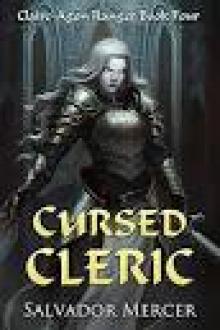 Cursed Cleric
Cursed Cleric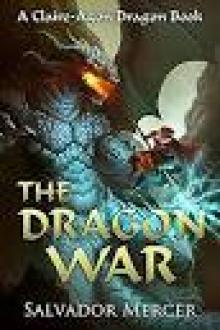 The Dragon War
The Dragon War Black Infinity
Black Infinity The Black Dragon: A Claire-Agon Dragon Book (Dragon Series 1)
The Black Dragon: A Claire-Agon Dragon Book (Dragon Series 1)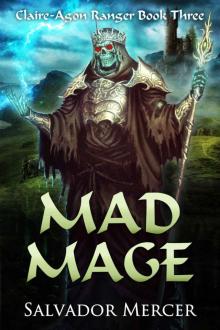 Mad Mage_Claire-Agon Ranger
Mad Mage_Claire-Agon Ranger Red Horizon: The Truth of Discovery (Discovery Series Book 2)
Red Horizon: The Truth of Discovery (Discovery Series Book 2)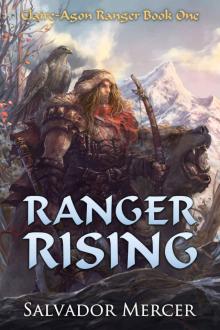 Ranger Rising: Claire-Agon Ranger Book 1 (Ranger Series)
Ranger Rising: Claire-Agon Ranger Book 1 (Ranger Series)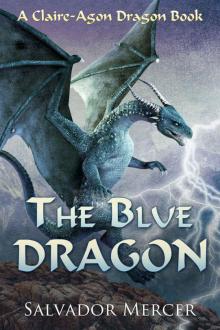 The Blue Dragon: A Claire-Agon Dragon Book (Dragon Series 2)
The Blue Dragon: A Claire-Agon Dragon Book (Dragon Series 2)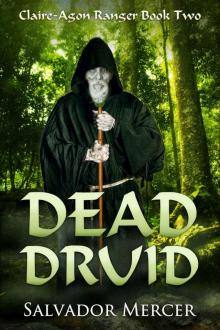 Dead Druid: Claire-Agon Ranger Book 2 (Ranger Series)
Dead Druid: Claire-Agon Ranger Book 2 (Ranger Series)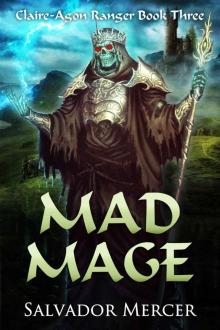 Mad Mage: Claire-Agon Ranger Book 3 (Ranger Series)
Mad Mage: Claire-Agon Ranger Book 3 (Ranger Series) The Green Dragon: A Claire-Agon Dragon Book (Dragon Series 3)
The Green Dragon: A Claire-Agon Dragon Book (Dragon Series 3) Lunar Discovery: Let the Space Race Begin
Lunar Discovery: Let the Space Race Begin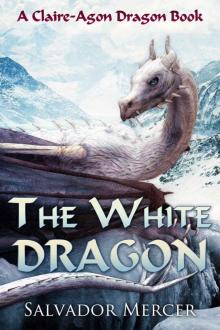 The White Dragon
The White Dragon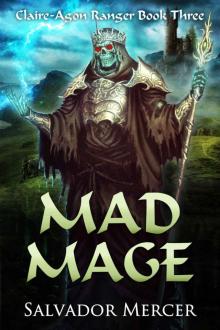 Mad Mage
Mad Mage